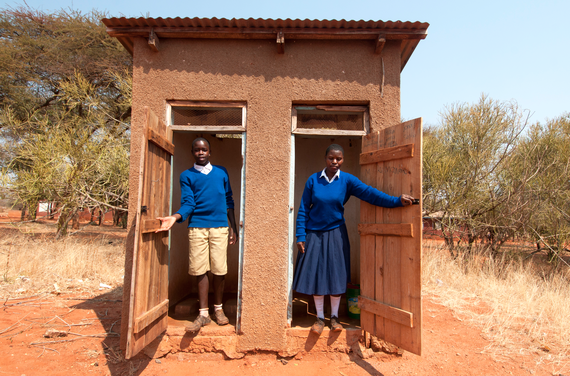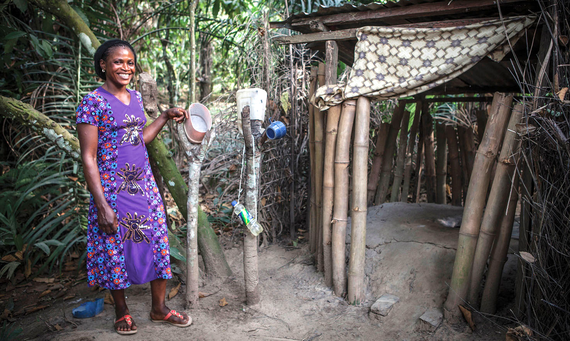This year, the global community adopted a new set of Sustainable Development Goals (SDGs) that will guide our development priorities until 2030. As we look back on the Millennium Development Goal era, we can champion the progress the world has made since 1990 in reducing extreme poverty, helping women and girls attain education, and providing clean water for the poor. Yet the target to halve the proportion of the population without sustainable access to basic sanitation fell short by almost 700 million. One in three people still live without access to adequate sanitation, 1 billion people defecate in the open, and 748 million people live without access to improved drinking water.
Every day, an estimated 1,500 children die from diarrhea largely caused by a lack of access to safe water, sanitation, and hygiene -- more than AIDS, malaria, and measles combined. Poor sanitation alone may also be responsible for as much as half of the world's stunting problems, due to diarrhea and related malnutrition. And poor sanitation prevents people from attending work and school due to illness, causing numerous negative economic impacts.
This World Toilet Day, it is time to harness the energy and enthusiasm behind the SDGs to reach the 2.4 people billion still lacking adequate sanitation and to enhance the dignity, security, health and financial well-being of a third of the world's population.
A hallmark of the SDGs is its acknowledgment that development goals are intrinsically linked; progress toward a single goal necessarily relies on progress toward other goals. That's why improving access to adequate and equitable sanitation will help to reduce poverty, improve education and health, enhance equality, promote inclusive economic growth, and help support sustainable cities. We can also contribute to women's empowerment by providing safe, private, and dignified ways for women to manage their menstrual hygiene needs.
While this is a global challenge, the solutions are local. The good news is that governments around the world are paying greater attention to the sanitation crisis, and recognizing that sustainable, appropriate, low cost, and culturally appropriate technologies exist, and are an important component of a broader system-based approach needed to safely manage sanitation waste.
Governments are also starting to work with local communities to allocate resources and address the basic needs of their people. This means prioritizing sanitation in national development plans and strategies, and providing budget support to meet these goals.
With the Water for the World Act of 2014, the U.S. Congress took a major step towards helping to provide sustainable access to water, sanitation and hygiene (WASH) in developing countries. USAID is working with a number of partners, such as WSSCC, to translate this political will into action, and to mobilize all available sources of financing to achieve universal access to sanitation-- last year USAID and its partners helped nearly 1.9 million people gain access to improved sanitation.
Investing in WASH is not only about saving human lives and dignity, it is essential for sustainable investments in human development. In July, development actors from around the world gathered in Addis Ababa, Ethiopia, at the third international Financing for Development Conference to reaffirm global commitments to mobilizing a variety of streams of capital for sustainable development, including private investment, domestic resources mobilized by developing countries, and foreign assistance. This commitment, along with the resounding global support for the SDGs underscores the need to work together to conceive of, plan for, and finance development in an entirely new way.
Previously, it was assumed that building toilets was sufficient for achieving total sanitation. However, we have learned that in practice this is not the case. All too often large sums of money were spent on building toilets for communities that were either poorly maintained or never even used. It is increasingly clear that 100 percent latrine coverage is not achievable with this approach nor is it enough to mitigate sanitation and hygiene-related diseases. Not surprisingly the answer lies in an a more sophisticated and comprehensive systems-based approach that includes stopping open defecation through sustained hygienic behavior change at scale while increasing the ability of communities, towns and cities to safely manage sanitation waste and prevent it from contaminating the environment and causing diseases.
For example, WSSCC's financing arm, the Global Sanitation Fund (GSF), gathers and channels donor funding to community-led programs in Africa and Asia. Thanks to GSF-supported programs, close to 10 million people in 13 countries no longer defecate in the open - and more people join their ranks every day. This is evidence that behavior change is an effective way to improve sanitation at scale in countries with very high rates of open defecation in a relatively short period of time. Sanitation is also a sound economic investment, for every dollar invested in sanitation, 5.5 dollars are gained in return.
This first World Toilet Day of the new SDG era, we will continue to push for bolder action and more innovative solutions to address this critical global health challenge. The late Nelson Mandela invited us to judge the importance of an issue not by how glamorous or attractive it is but by how much good it does for how many people. On that basis, sanitation is one of the most important issues in the world. The world simply cannot wait.
Chris Williams is the Executive Director of the Water Supply and Sanitation Collaborative Council (WSSCC), an international organization of the United Nations that improves access to sanitation, hygiene and water supply in Africa and Asia.
Christian Holmes is the Deputy Assistant Administrator in USAID's Bureau for Economic Growth, Education and Environment, and the Agency's first Global Water Coordinator, responsible for overseeing USAID's global water portfolio.


